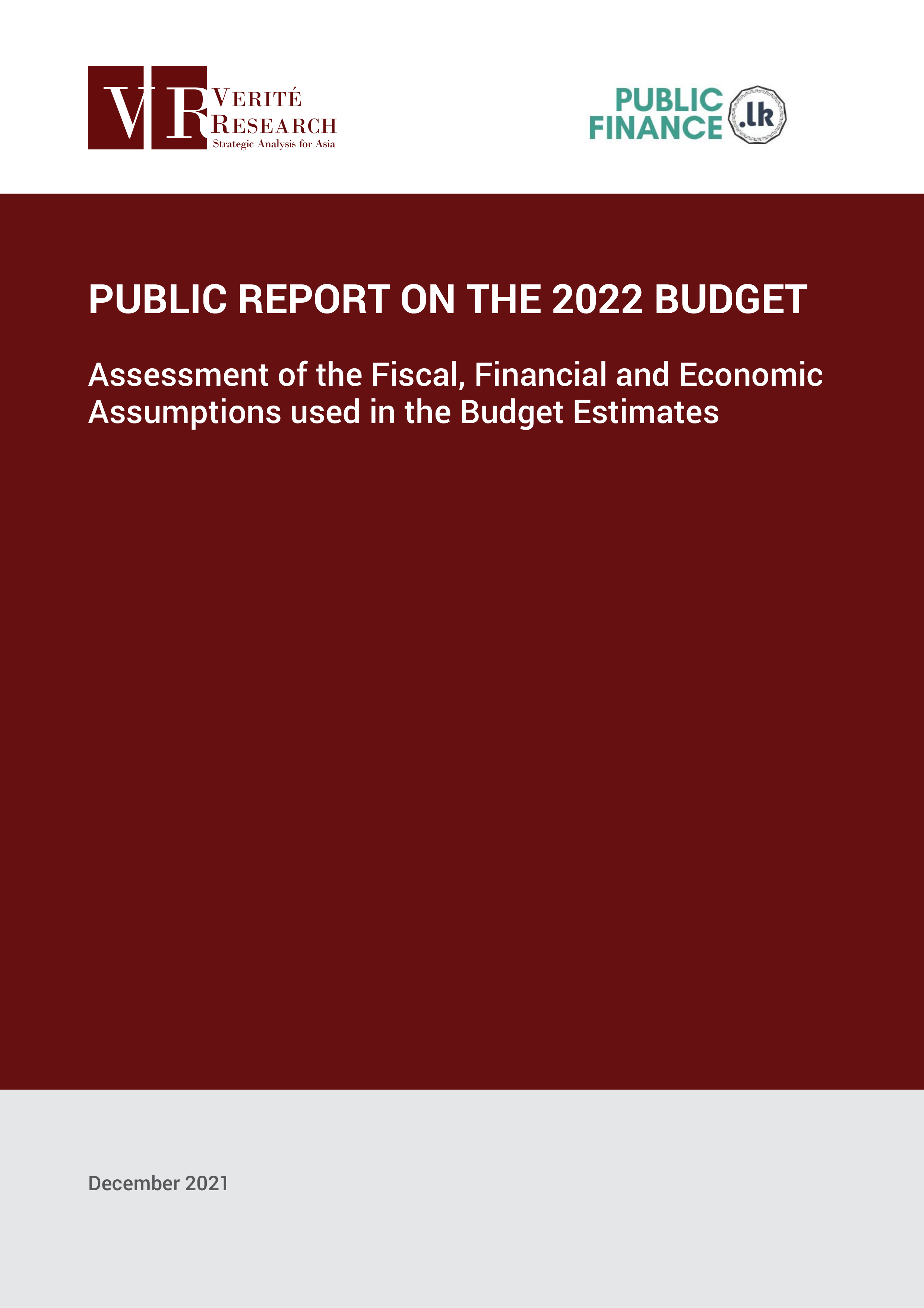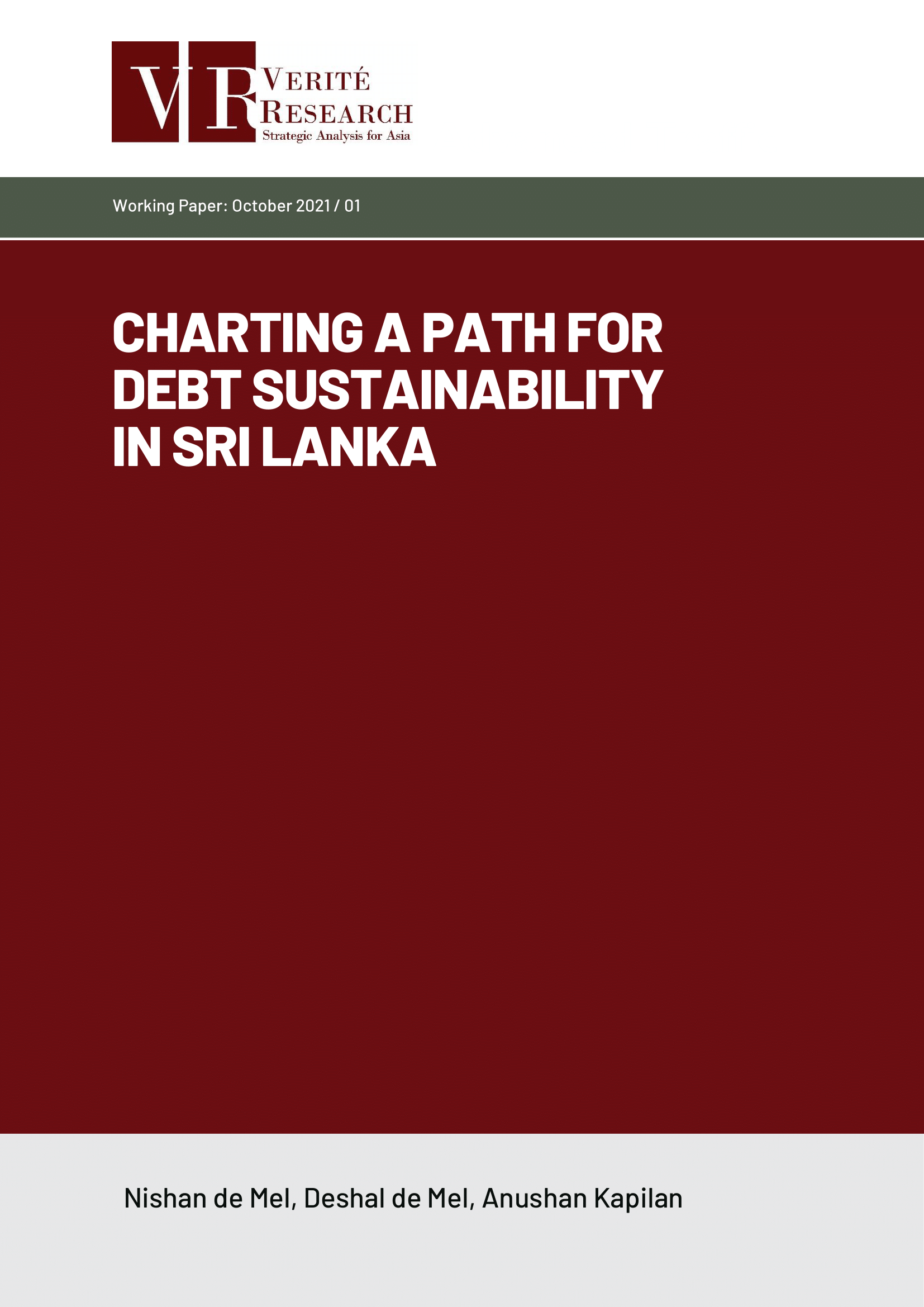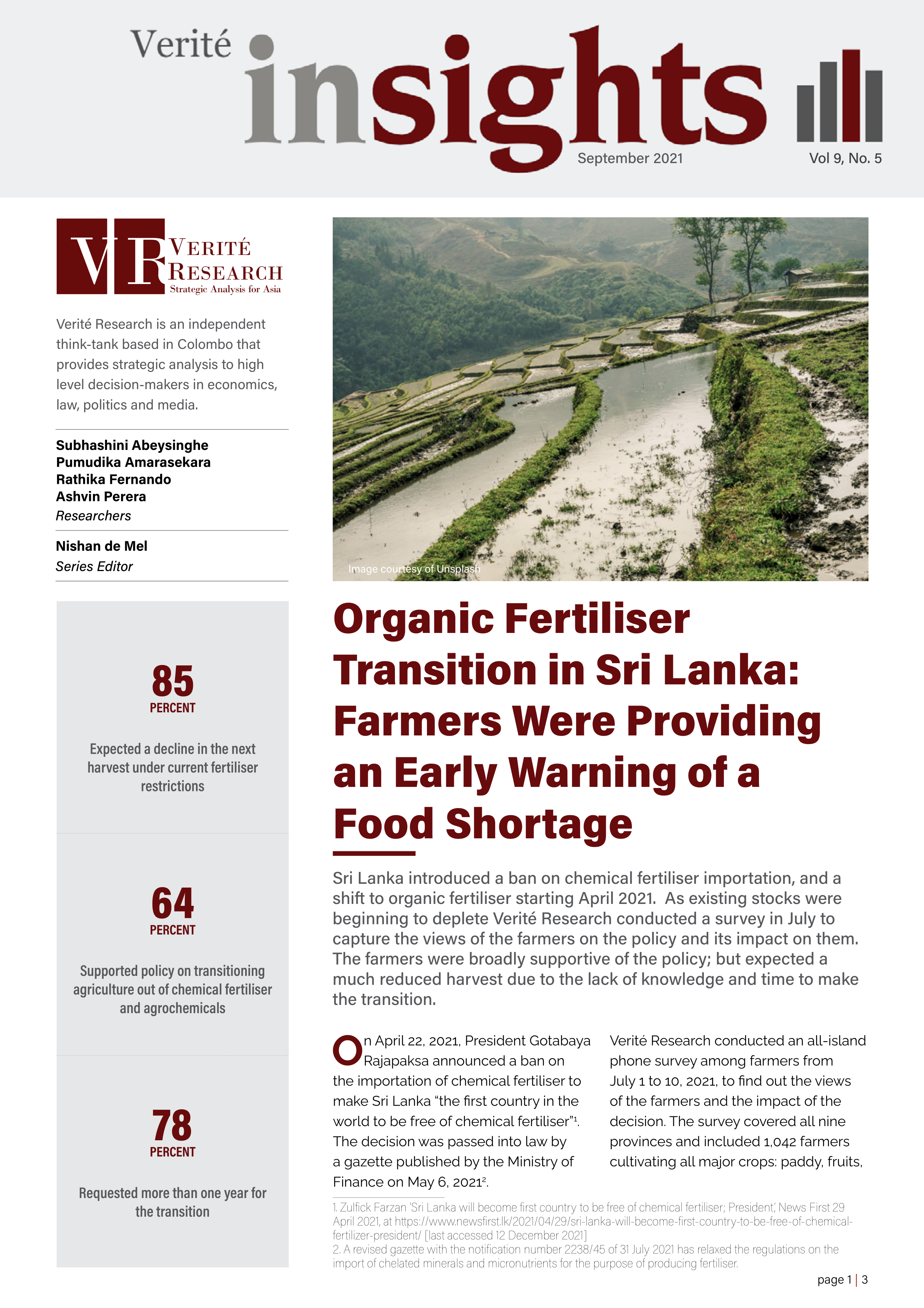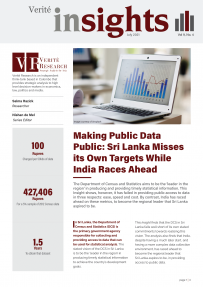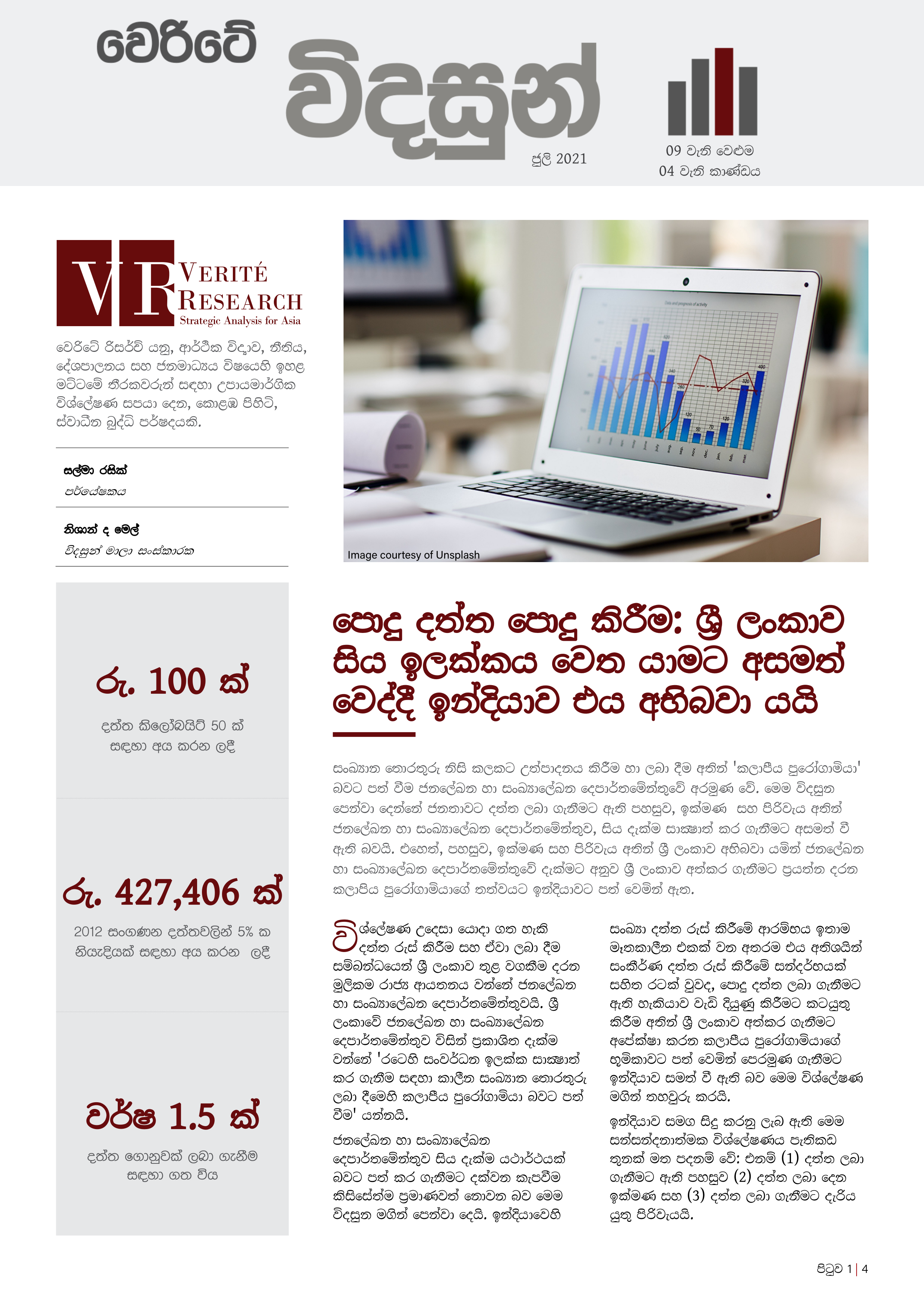This report provides an assessment and analysis of the fiscal, financial and economic assumptions and estimates applied in the formulation of the 2022 Budget.
Since December 2018 Sri Lanka has been subject to three notches down in rating by S&P, Moody’s and Fitch Ratings. This situation is a historical first for Sri Lanka. While many of Sri Lanka’s key macroeconomic indicators have, in the past recorded more negative levels, Sri Lanka has never in the past, been evaluated as being at such a serious level of risk, in terms of defaulting on its debt.
ශ්රී ලංකාව 2021 අප්රේල් මස සිට රසායනික පොහොර ආනයනය තහනම් කරමින්, කාබනික පොහොර වෙත මාරු වීමට පියවර ගන්නා ලදී. පවතින රසායනික පොහොර තොග අඩු වෙමින් පවතින වාතාවරණයක් තුල පොහොර ප්රතිපත්තිය පිළිබඳව ගොවීන්ගේ අදහස් සහ එහි බලපෑම අවබෝධකර ගැනීම සඳහා වෙරිටේ පර්යේෂණ ආයතනය ජූලි මාසයේදී සමීක්ෂණයක් පවත්වන ලදී. ගොවීන් මෙම ප්රතිපත්තියට පුළුල් ලෙස සහයෝගය දැක්වූ නමුත් ගොවීන්ගේ අදහස වුයේ මෙම පරිවර්තනය සාර්ථකව කිරීමට අවශ්ය දැනුම හා කාලය නොමැතිකම නිසා බොහෝ අඩු අස්වැන්නක් ලැබෙනු ඇති බවයි.
Sri Lanka introduced a ban on chemical fertiliser importation, and a shift to organic fertiliser starting April 2021. As existing stocks were beginning to deplete Verité Research conducted a survey in July to capture the views of the farmers on the policy and its impact on them. The farmers were broadly supportive of the policy; but expected a much reduced harvest due to the lack of knowledge and time to make the transition.
Sri Lanka’s Department of Census and Statistics (DCS) is the primary government agency responsible for collecting data, producing useful statistics, and disseminating it.
සංඛ්යාන තොරතුරු නිසි කලකට උත්පාදනය කිරීම හා ලබා දීම අතින් ‘කලාපීය පුරෝගාමියා’ බවට පත් වීම ජනලේඛන හා සංඛ්යාලේඛන දෙපාර්තමේන්තුවේ අරමුණ වේ. මෙම විදසුන පෙන්වා දෙන්නේ ජනතාවට දත්ත ලබා ගැනීමට ඇති පහසුව, ඉක්මණ සහ පිරිවැය අතින් ජනලේඛන හා සංඛ්යාලේඛන දෙපාර්තමේන්තුව, සිය දැක්ම සාක්ෂාත් කර ගැනීමට අසමත් වී ඇති බවයි. එහෙත්, පහසුව, ඉක්මණ සහ පිරිවැය අතින් ශ්රී ලංකාව අභිබවා යමින් ජනලේඛන හා සංඛ්යාලේඛන දෙපාර්තමේන්තුවේ දැක්මට අනුව ශ්රී ලංකාව අත්කර ගැනීමට ප්රයත්න දරන කලාපිය පුරෝගාමියාගේ තත්වයට ඉන්දියාවට පත් වෙමින් ඇත.
In 2014 a data dissemination policy was introduced by the Department of Census and Statistics (DCS) in Sri Lanka. The DCS is the primary agency responsible for the collection, compilation and dissemination of official statistics.
ජාත්යන්තර වෙළඳ දත්ත පොදු දේපලකි. සැබෑ කරුණු මත පදනම් වූ ප්රතිපත්ති සැලසුම් කිරීමට, ව්යාපාරවලට වඩාත් නිවැරදි තීරණ ගැනීමට, ආර්ථික හා සමාජීය කරුණු පිළිබඳ මහජන පර්යේෂණ සඳහා පෙළඹවීමට සහ ජනතාවට රජයේ වගවීම වැඩි දියුණු කිරීමට දත්ත සඳහා ප්රවේශය අත්යවශ්ය වේ. එහෙත්, ශ්රී ලංකා රේගුවේ දත්ත බෙදා හැරීමේ ප්රතිපත්තිය දත්ත පොදු භාණ්ඩ ලෙස දැකීමට පටහැනි ආකාරයෙන් සකස් වී ඇත. කලාපීය හා ගෝලීය ප්රවණතාව වන්නේ මෙම දත්ත වලට ඇති ප්රවේශය පහසු කිරීම වුව ද, ලංකාව සම්බන්ධයෙන් යාවත්කාලීන දත්ත සොයා ගැනීම පහසු නොවන අතරම ඒවා නොමිලයේ ලබා ගත නොහැක.
International trade data is a public good. Yet, SLC’s data dissemination policy is currently at odds with seeing the trade data it collects as a public good.
Successful economies have increasingly recognised the importance of improving access to data collected by governments. Accurate, timely and easily accessible data helps private sector growth and results in improved delivery by government. Sri Lanka Customs is the key government agency that collects trade data. Access to timely trade data is vital for firms engaging in international trade to make sound business decisions. It is also the basis on which countries should be formulating their trade policies and assessing their impact.
